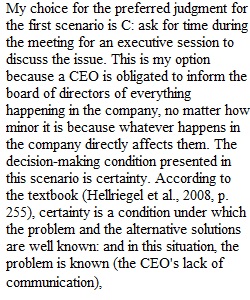


Q INSTRUCTIONS Complete the Experiential Exercise "What are your Ethical Judgments?" on page 281 by supplying your choice for the preferred judgment for each of the four scenarios and the reasons you chose that particular answer, also answer the three questions at the end of the exercise. Make sure you tell me why you chose one answer over the others. Submit you work as an attachment. CHAPTER 7 OVERVIEW In this chapter, we discuss some of the fundamentals of planning and the strategies employed by organizations. In Chapter 1, we noted that planning involves determining organizational goals and the means to reach them. We consider planning a basic managerial function because it sets the framework and direction for the organizing, leading, and controlling functions. In addition, the ability of an individual, team, or organization to plan is an integral part in each of the six managerial competencies that we develop throughout this book. OBJECTIVES After studying this chapter, the student should be able to: 1. Describe the importance and core components of strategic and tactical planning. 2. Discuss the effects of organizational diversification strategies on planning. 3. Describe the three basic levels of strategy and planning. 4. State the primary tasks of the strategic business-level planning process. 5. Explain the generic competitive strategies model. 6. Explain the integrated strategies model.
View Related Questions